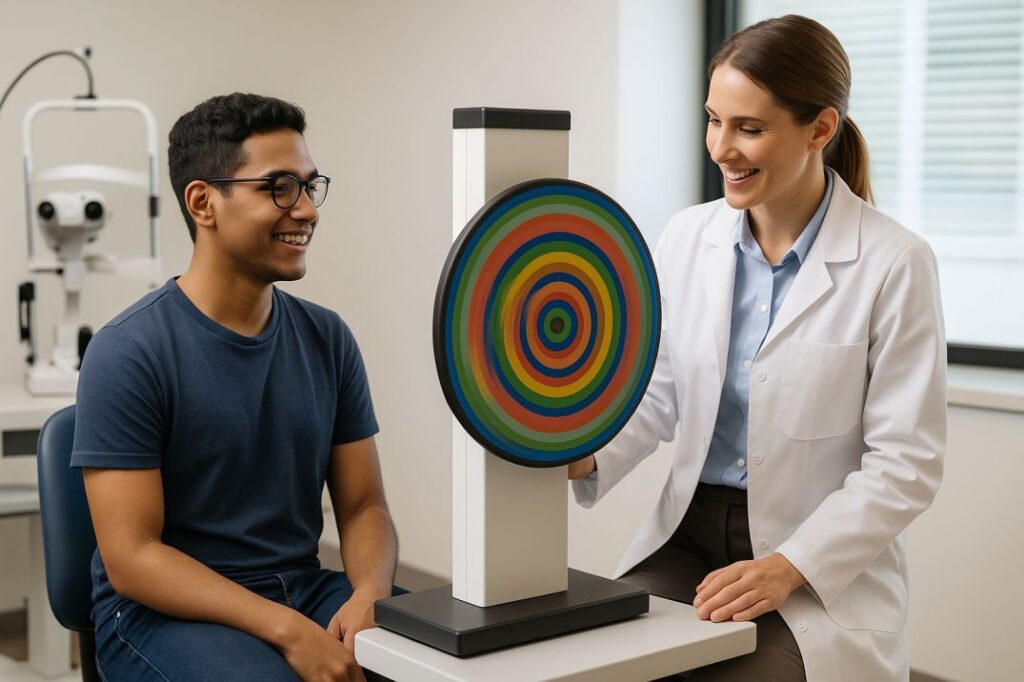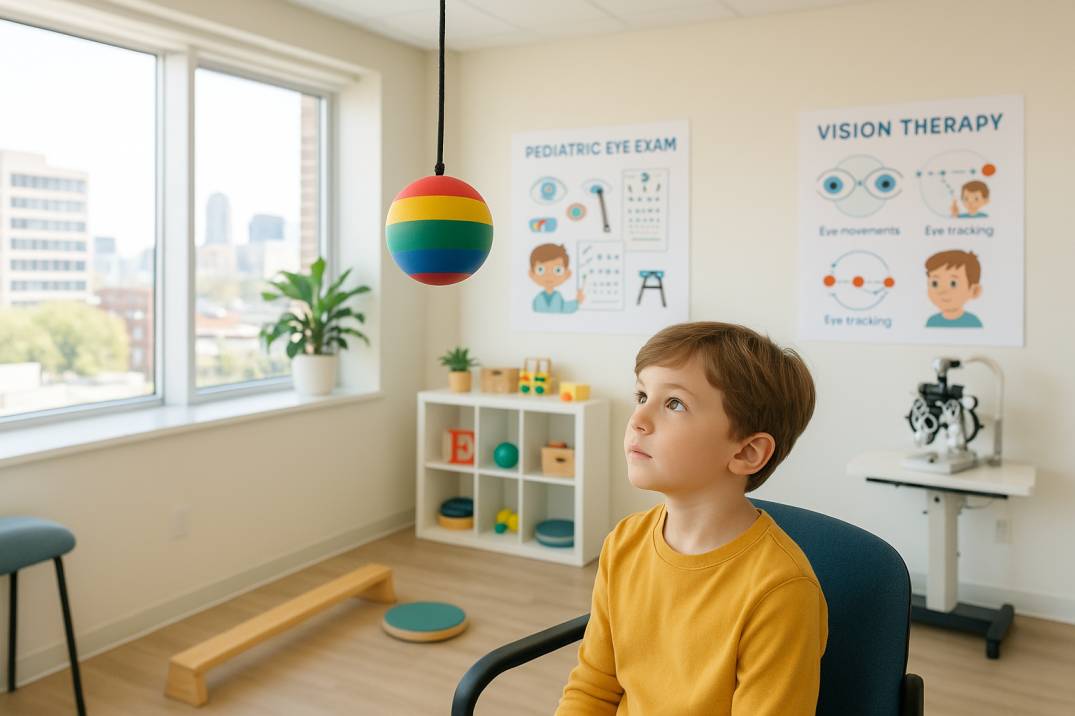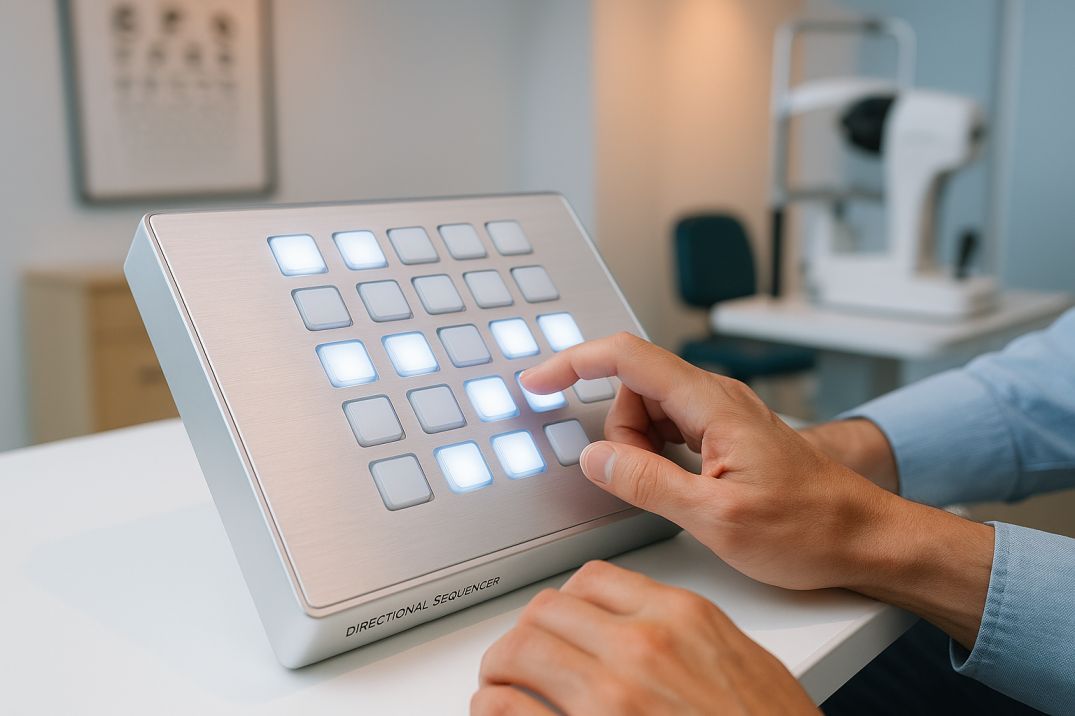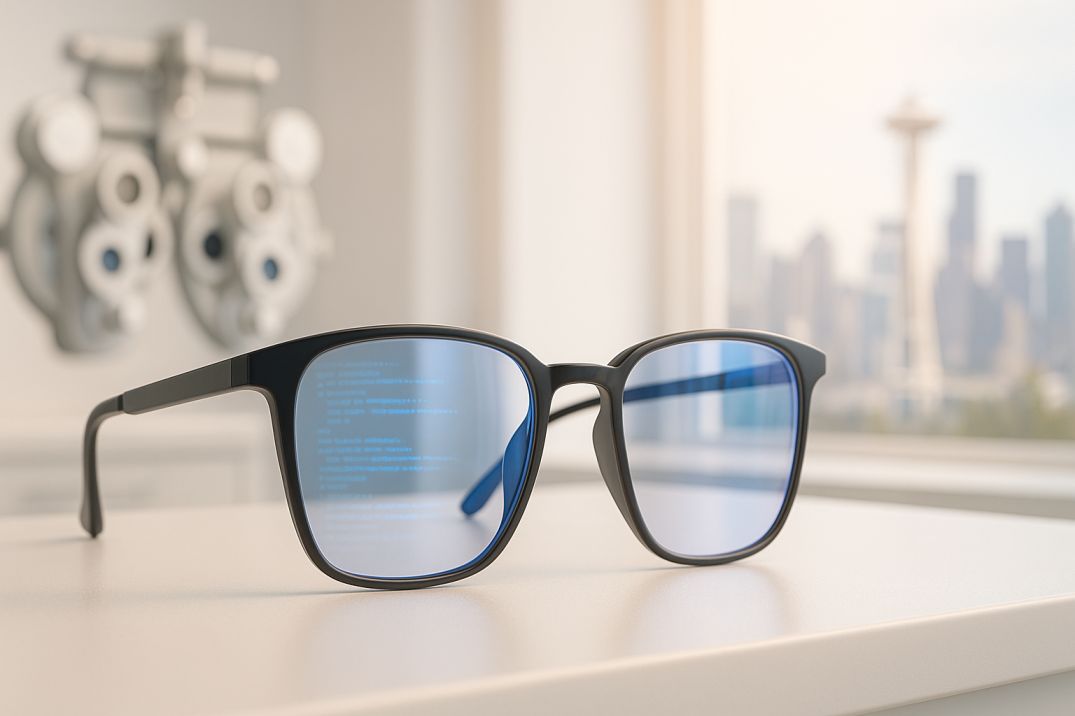Rotation Trainer Vision Therapy | Seattle EyeCare
TL;DR: Bottom Line Up Front
Rotation trainers at Cannon EyeCare in Seattle are cutting-edge vision therapy devices featuring precision rotating discs that improve eye-hand coordination, visual tracking, and perceptual awareness. These professional-grade rotation trainers effectively treat convergence insufficiency and binocular vision disorders with proven 75% success rates. Available at our University Village and Pike Place Market locations.
What Are Rotation Trainers?
Rotation trainers at Cannon EyeCare consist of sophisticated therapeutic disks with specialized designs that attach to precision-engineered bases. Professionally designed to test and enhance eye-hand coordination, perceptual awareness, dynamic visual acuity, and fusional training, these rotation trainers represent the cornerstone of modern vision therapy at our Seattle locations.
Unlike basic eye exercises, rotation trainers at Cannon EyeCare are clinical-grade equipment requiring professional supervision. As therapeutic disks rotate at variable speeds (5-32 RPM), patients perform carefully designed visual tasks that enhance coordination, spatial awareness, and visual acuity under expert guidance.
Advanced Technology Features
Our complete rotation trainer systems feature electronic control units with reversible operation, variable speed control, heavy-duty motor drives, multi-positional tilt heads, and safety mechanisms. Professional rotation trainers work with various therapeutic disc designs, each targeting different visual skills, including pegboard patterns, tracking targets, and convergence training configurations.
Who Needs Rotation Trainers?
Children and Students in Seattle
Young patients at Cannon EyeCare often demonstrate dramatic improvements from rotation trainer therapy:
- Difficulty maintaining focus during homework or classroom activities
- Frequent loss of place when reading
- Eye strain after short periods of near work
- Headaches after reading or computer use
- Poor handwriting or fine motor coordination difficulties
- Challenges with sports requiring ball tracking
Seattle Professionals and Adults
Working adults in visually demanding careers frequently benefit from rotation trainer therapy:
- Computer professionals experiencing digital eye strain
- Athletes seeking enhanced performance through improved visual skills
- Healthcare workers need visual precision
- Adults with untreated childhood vision disorders affecting work performance
Rehabilitation Patients
Rotation trainers serve important roles in rehabilitation medicine for stroke patients, traumatic brain injury patients, concussion patients, and those with neurological conditions affecting eye movement control.
Medical Conditions Treated
Primary Conditions
Convergence Insufficiency: The most extensively researched application, where rotation trainers help strengthen the eye muscles’ ability to work together for near vision tasks. Research shows 75% of patients experience significant improvement with professional office-based therapy.
Accommodative Dysfunction: Difficulty focusing at varying distances, particularly problematic for students and professionals transitioning between near and distance vision tasks.
Oculomotor Dysfunction: Problems with precise eye tracking and scanning movements that affect reading comprehension, academic performance, and sports activities.
Visual Perceptual Disorders: Difficulties processing and interpreting visual information, impacting learning abilities and daily functional activities.
Treatment Benefits
- Enhanced hand-eye coordination for athletes and professionals
- Improved dynamic visual acuity for driving and sports performance
- Better spatial awareness and depth perception
- Increased visual processing speed
- Reduced digital eye strain
- Enhanced reading fluency and comprehension
How Treatment Works
Initial Assessment
Your rotation trainer therapy begins with a comprehensive binocular vision evaluation at our University Village or Pike Place Market location, assessing:
- Binocular coordination and eye teaming functions
- Tracking and scanning skills
- Focusing accuracy for near and distance vision
- Visual processing speed and efficiency
- Eye-hand coordination and visual-motor integration
Treatment Session Structure (45-60 Minutes)
Warm-up (5-10 minutes): Simple visual tracking exercises. Core Training (20-30 minutes): Targeted rotation trainer activities using specific disc patterns. Integration Tasks (10-15 minutes): Combining visual skills with motor coordination. Cool-down (5 minutes): Visual relaxation exercises
Treatment Protocols
Rotation trainer therapy begins with foundational visual tasks and systematically increases in complexity. Our advanced rotation trainers feature variable-speed, dual-direction capabilities precisely adjusted for oculomotor pursuit training. Each patient receives individualized protocols based on specific visual deficits and personal goals.
Scientific Evidence
Research Foundation
The effectiveness of rotation trainers has substantial scientific support. The landmark Convergence Insufficiency Treatment Group study demonstrated that 75 percent of children who received weekly office-based vision therapy experienced significant improvement within 12 weeks.
Key Supporting Studies
Convergence Insufficiency Treatment Trial (CITT): Archives of Ophthalmology studies showing 75% improvement rates with office-based vision therapy, establishing evidence for rotation trainer effectiveness.
Neuroplasticity Research: Journal of Optometry studies demonstrating measurable cortical activity increases after vision training, explaining the biological mechanism of rotation trainer benefits.
Perceptual Vision Therapy Studies: Recent clinical research shows a 2.6 logMAR line improvement in visual acuity with structured vision therapy protocols.
The brain’s neuroplasticity provides the biological foundation for rotation trainer effectiveness, with experimental studies showing measurable physiological effects of specific vision therapy exercises.
Treatment Outcomes & Timeline
Expected Results
Patients typically experience quantifiable improvements:
- Convergence Ability: Faster, more comfortable near vision focusing
- Tracking Accuracy: Smoother, more precise eye movements
- Processing Speed: Enhanced visual information processing
- Binocular Coordination: Improved eye teamwork and depth perception
- Visual Endurance: Increased ability to maintain visual tasks without fatigue
Real-World Applications
Enhanced visual skills translate to improved daily activities, including better academic performance, enhanced computer work comfort, improved athletic performance, safer driving, and better overall visual comfort for daily living tasks.
Timeline
Program Duration: Most patients complete 12-16 weeks with weekly sessions.Session Length: 45-60 minutes with 30-35 minutes of rotation trainer exercises. Initial Improvements: Most patients notice improvements within 4-6 weeks.Success Rate: Significant improvement achieved in the majority of cases with professional supervision
Cost & Insurance Information
Investment Details
Session Costs: $125-$250 per session at Cannon EyeCare, varying based on treatment complexity. Complete Programs: $1,000-$5,00,0, depending on duration and intensity.ty Payment Plans: Various options available to make therapy accessible
Insurance Coverage
Vision therapy services are increasingly covered when medically necessary for documented binocular vision disorders. Many major insurance plans now recognize vision therapy as a legitimate medical treatment. Our team helps verify benefits and provides pre-authorization documentation.
Advanced Technology
The rotation trainers at Cannon EyeCare include professional floor-standing units offering maximum stability and therapeutic versatility. Our systems represent the gold standard in rotation trainer technology with electronic controls, variable speeds, and heavy-duty construction.
Latest rotation trainers incorporate digital controllers and precise speed regulation. Emerging research explores combining traditional rotation trainers with virtual reality technology, with studies showing VR therapy effectively improved vergence function and relieved convergence insufficiency symptoms.
Resources and Research Citations
The following peer-reviewed research studies and authoritative sources support the effectiveness of rotation trainers and vision therapy discussed in this article:
1. Convergence Insufficiency Treatment Trial (CITT) – National Eye Institute
Study: “A randomized clinical trial of treatments for convergence insufficiency in children”
Source: Archives of Ophthalmology, 2005; 123:14-24
Link:
https://www.ncbi.nlm.nih.gov/pmc/articles/PMC1351298/
Key Finding: 75% of children experienced significant improvement with office-based vision therapy coupled with home exercises
2. Vision Therapy Neuroplasticity Research – Journal of Optometry
Study: “Science-based vision therapy and neuroplasticity effects”
Source: Journal of Optometry, 2016; PMC Neuroscience Studies
Link:
https://www.ncbi.nlm.nih.gov/pmc/articles/PMC5030323/
Key Finding: Demonstrated measurable cortical activity increases after repetitive vergence training exercises
3. Effectiveness of Vision Therapy in School Children – PMC Research
Study: “Effectiveness of Vision Therapy in School Children with Symptomatic Convergence Insufficiency”
Source: Journal of Ophthalmic and Vision Research, 2017
Link:
https://www.ncbi.nlm.nih.gov/pmc/articles/PMC5423373/
Key Finding: Significant improvements in near point of convergence and positive fusional vergence after 8 weeks of vision therapy
Schedule Your Evaluation
If you’re experiencing symptoms that might benefit from rotation trainer therapy, schedule a comprehensive vision evaluation at Cannon EyeCare. This assessment determines whether rotation trainer therapy is appropriate for your specific needs.
What to Bring
- Current eyeglass/contact prescription and recent eye exam records
- Detailed symptom list and impact on daily activities
- Previous vision therapy or treatment information
- Insurance information for benefits verification
Take Action Today
Ready to explore how rotation trainer therapy at Cannon EyeCare might benefit you?
Contact our Seattle practice today to schedule your comprehensive vision evaluation and discover the difference professional rotation trainer therapy can make.
Visit our convenient University Village or Pike Place Market locations to begin your journey toward better vision.
FAQs
-
Rotation trainers help improve eye-hand coordination, spatial awareness, perceptual skills, and visual acuity by having users perform tasks while rotating a disk




